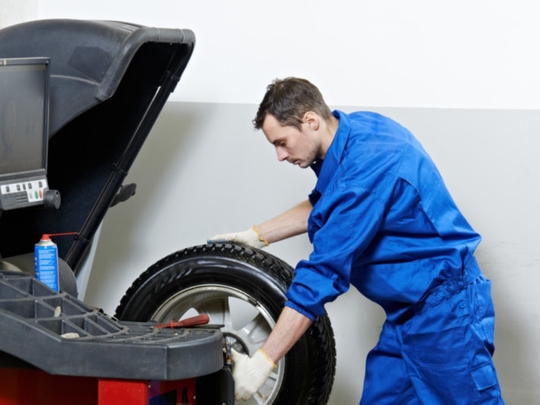
Regular services are essential for safe driving, but when the summer heat sets in additional precautions are necessary to keep your car on the road.
“Summer can be tough on cars, when the heat can destroy batteries and stress the cooling system and tyres. As a precaution, these should be checked periodically during summer to help avoid breakdowns and car problems,” says Tamer Karam, Brand Marketing Manager at ZDEGREE, a auto services business in Dubai.
Tyres
Who hasn’t seen the rubber after a blowout strewn across the highways? To maximize tyre life and safety, their condition and pressure should be checked monthly and they should be rotated every 10,000km, according to Karam.
But in summer, he warns, tyres need special care as the high temperatures puts added stress on them. “Summer heat will cause the pressure in a tyre to rise, therefore it’s important to regularly check the pressure when they are cold. Your owner’s manual includes the recommended air pressure for your vehicle’s tyres”.
Neil Coolledge, General Manager of SpeedFit also recommended checking the physical condition of the tyre. “The air pressure, especially in summer needs to be monitored because a drop of five degrees celicius can also cause a loss in pressure of one pound per square inch (PSI). The tread depth should not be less than 4mm,” he adds. He recommended drivers carry a product a emergency repair kit so they can seal a puncture and quickly re-inflate the tyre.
Sorin Toma, Technical Manager at 800-Battery, warned that “roughly 80 percent of all breakdowns are caused by tires and batteries”. His rule of thumb is to reduce tire pressure by 1 PSI for every 10 degrees of increase in temperature, as the hot air expands.
Battery
Excessive heat and overcharging can shorten the life of a battery. Heat causes the battery fluid to evaporate, which then damages the internal structure of the battery. “A malfunctioning component in the charging system, usually the voltage regulator, allows too high a charging rate, which will eventually destroy a battery. To get most life of a battery we recommend a proper check of electrical system to ensure that it is charging at the correct rate,” Karam adds.
Batteries charge when a vehicle is driven and many think that disconnecting the battery whilst a vehicle is standing, when they go on holiday, will stop it from draining flat.
But, warns Toma: “Disconnecting battery terminals before you leave might not be a great idea since your car loses its electronic memory. Things like radio, engine modules, theft alarm systems need power from the battery. Be prepared to jump start your car, or get a new battery, when you return.” He recommends seeking professional help, as batteries can be damaged if they are incorrectly jump started.
Cooling system
You need to look after your cooling system that works overtime during summer to keep the engine from overheating. “To keep the cooling system working effectively, the coolant and distilled water mixture for a vehicle’s radiator should be fifty-fifty. Never open a hot radiator cap when checking the coolant level in the reservoir. Regularly check all gauges, not just the coolant, while driving throughout the summer,” advises Karam.
As a rule of thumb, the coolant should be changed annually on most vehicles to keep the cooling system clean, which helps prevent corrosion and makes sure it has the proper boiling point, according to Karam. “A pressure test, thermostat test, a cooling fan test and a visual inspection for leaks and corrosion should also be done annually,” he adds.
It is also a good idea to check hoses and drive belts for cracks, bulges or frayed edges. “The radiator should be kept clean, so have it washed periodically,” Karam adds.
Coolledge points out that the coolant level needs to be checked from the reservoir and that all fluids have to be changed regularly. “Especially in summer, fluids lose their physical properties if not changed in time. Always refer to the owners manual for the accurate grading of oil,” he advises.
Toma recommends what he terms ‘the flower check’, making sure that the following are inspected ever few weeks and especially before the summer: fuel, lights, oil, water, electrics and rubber components. “We [also] get a lot of inquires from clients who took their car keys for a swim. Water will damage car keys so best to keep them safe and out of the water,” he says.
For all seasons
Whilst these are not summer specific, brake and the steering suspension systems are worth looking into as well. Normal wear and tear means eventually they’re going to need replacement, said Coolledge.
He advises monitoring the warning lighs on the dash, which could give you harmless warnings and more serious alerts, such as low brake fluid, or that brake pads need replacement.
Regular maintenance will also take care of the suspension that “maintains the relationship between the wheels and the frame and helps absorb the energy from road irregularities,” explains Coolledge.
Coolledge also advises generally taking a quick look round your vehicle before hitting the road. A professional visual health check (VHC) is also a quick way to ensure all is as it’s supposed to be.
“Typically carried out by a technician, a VHC, can be done in a relatively limited period of time,” he says. The VHC includes a look at the warning lights and electronics, under the bonnet and underside, as well as wheels, tyres and brakes. “It usually does not involve any dismantling of the vehicle, but might or not, include the removal of wheels,” Coolledge explained.
Walters is a journalist based in the UAE.












